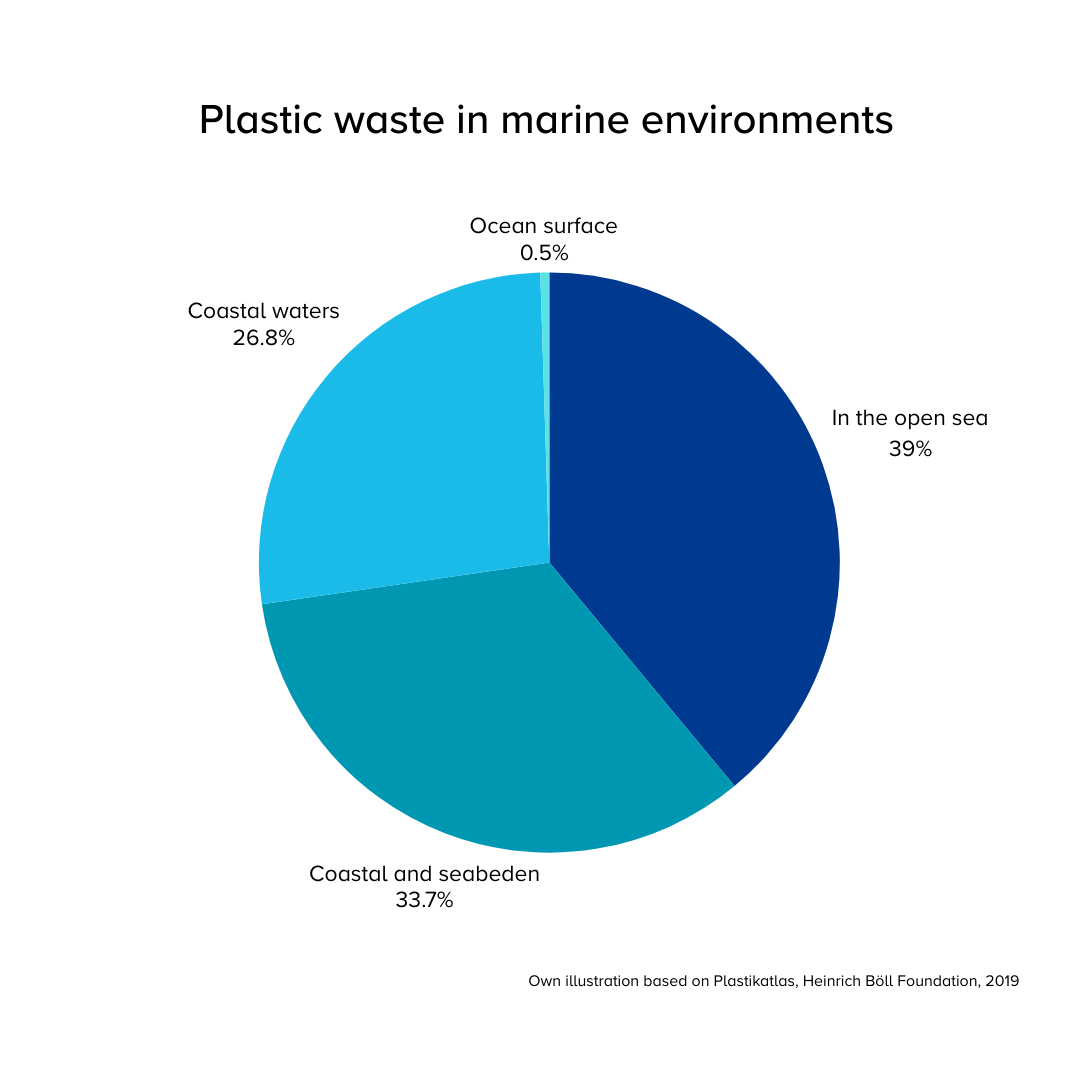Summer, sun, and plastic waste – why climate action starts at the beach
May 27, 2025
For many, this is the best time of year: vacation season. And for most, that means heading to the sea. Oceans remain among the most popular travel destinations in Europe and North America. But while we cool off in the salty water, one thing often goes unnoticed: plastic has long become part of this ecosystem. Every minute, the equivalent of one garbage truck full of plastic enters the ocean. Current estimates suggest that around 165 million tonnes of plastic are already circulating in our seas. Most of this waste is invisible, only about 0.5% floats on the ocean surface (see illustration). The rest disperses into the open sea, washes up on coastlines, or sinks to the ocean floor. Plastic waste is now found throughout marine environments, from coastal waters to deep-sea trenches, even in remote regions like the South Pacific or the Arctic.
|
 |
How plastic threatens marine ecosystemsThe image of a turtle entangled in a fishing net is familiar to many, and sadly, it's not an isolated case. An estimated one million seabirds and 100,000 marine mammals die each year from ingesting or becoming trapped in plastic. Many marine species mistake plastic for food. The result: they starve with full stomachs, as the plastic blocks or damages their digestive tracts. But the problem goes deeper. Plastic pollution doesn’t just affect individual species; it disrupts entire ecosystems. Marine animals and plants exist in a finely balanced relationship with their environment. Even small disturbances can throw this system off. Plastic covering the seabed reduces the availability of light, nutrients, and oxygen. This alters sediment structures and displaces key species. Coral reefs, often called the rainforests of the sea, are particularly vulnerable. When covered with plastic, they receive less light and fewer nutrients. Studies show that corals exposed to plastic are up to 89 times more likely to develop disease. Ocean-based climate action under pressureOceans play a vital role in global climate action. They absorb roughly one-third of human-made carbon emissions. Overall, our oceans store around 16 times more carbon than all land-based ecosystems (forests, soils, plants). Two key mechanisms enable this:
Plastic pollution threatens this carbon sink superpower: microplastics reduce the ocean’s ability to absorb carbon by impairing plankton’s ability to bind and process carbon. Additionally, they can hinder phytoplankton growth, further weakening the biological carbon pump.
Reducing plastic pollution through climate projectsOur oceans face multiple, interacting threats: plastic pollution, global warming, overfishing, and ocean acidification all strain marine ecosystems. These pressures undermine biodiversity and the ocean’s climate regulation role. To counter this, the most effective step is to stop plastic waste from entering the ocean in the first place. You can contribute today by supporting a ClimatePartner-backed plastic project: 1. Plastic Bank: Preventing plastic pollution worldwide In coastal regions affected by poverty and lacking waste management infrastructure, such as Brazil, Egypt, Indonesia, the Philippines, Cameroon, and Thailand, participants collect plastic and exchange it for income or essential goods and services, in addition to incentives like health and job insurance and food vouchers. As of May 2025, more than eight billion plastic bottles have been collected. ClimatePartner offers this as a combined project: for every tonne of carbon reduced via a certified project (e.g., clean cookstoves in India), 10 kg of ocean-bound plastic is collected. 2. Plastic collection in Cambodia: Local action for clean coasts In Sihanoukville, Cambodia, a coastal city with 90,000 residents that generates about 87,000 tonnes of plastic waste annually, this project involves residents in plastic collection in exchange for fair wages, training, and social benefits. The initiative promotes:
Collectors are employed, receive healthcare, and undergo training programs on ocean plastic management and safe collection practices. Want to learn more about projects that tackle plastic pollution? Schedule a call with our experts to protect our oceans now.
|